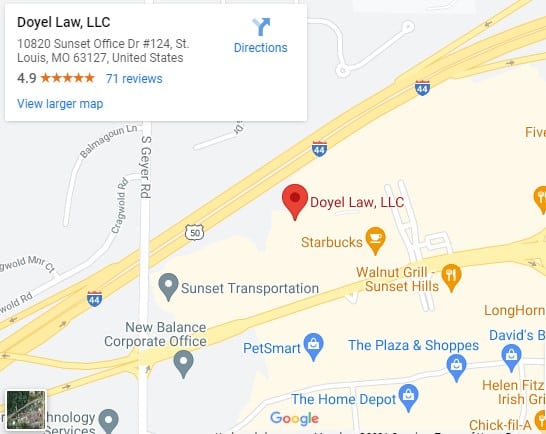Divorce and Bankruptcy Attorney in Sunset Hills, Missouri
Divorce-related legal difficulties might be amicable or highly contentious. In any situation, you’ll need an experienced and qualified lawyer on your side to safeguard your rights and look for the best course of action. Get Doyel Law to work for you if you’re going through a divorce.
Bankruptcy, on the other hand, is a frightening thought and asking someone inexpert regarding this idea can aggravate the situation. Exemptions, means testing, preferences, and fraudulent transfers are just some of the words that can cause you stress and fear. We’re here at Doyel Law to walk you through the process so you can receive the new start and better credit you deserve.
Our Sunset Hills lawyers understand that each individual’s situation is unique, and that no one-size-fits-all solutions exist. We want to learn about you and have you learn about us because we believe that trust and honesty are the characteristics of an attorney-client relationship. We can only design a plan suitable for you if we learn about your goals and difficulties as a team.
Why Do I Need a Divorce and Bankruptcy Attorney in Missouri?
Even if you have previously gone through a divorce, your knowledge pales in comparison to what a divorce lawyer knows. A qualified divorce attorney understands what judges are looking for and how to present evidence and ask questions during trial, which can help you receive the best result possible. Without a thorough understanding of the law and legal training, which is continually changing, you may find yourself at a major disadvantage. It is also quite difficult to prepare all of the essential documents without the assistance of an attorney.
Furthermore, in terms of getting a qualified bankruptcy lawyer, it is important to bear in mind that every facet of the bankruptcy procedure must be understood. You can petition for any of the personal bankruptcy debts that fit your situation as a person who still owes money. You can either ask the court to discharge or reduce some of your liabilities if you file for bankruptcy in Missouri, or you can petition the court to adopt a debt repayment plan. Obviously, if you conduct these procedures on your own, they can be highly stressful, which is why you need hire a qualified bankruptcy lawyer for this legal matter.
In either legal case, our Missouri divorce and bankruptcy lawyer can examine your situation and provide the best divorce and bankruptcy options for you! We can assist you in receiving the aid you require. It is critical that you have a competent attorney on your side to protect your rights and interests. These cases have long-term consequences, and you don’t want to look back and regret your decision.
What is Divorce?
The legal end of a marriage is called a divorce. Every state has its rules for how to accomplish a divorce, but all of them require a judge to evaluate and approve the divorce settlement or, if the spouses can’t agree, to decide how property will be divided and parenting time will be shared. You are not officially divorced and cannot remarry unless you get a court order signed by a judge. In Missouri, the process is known as “dissolution” since the matrimonial bonds are dissolved.
While emotions run high for couples going through a divorce, it is critical to make decisions with a level mind because they might have long-term consequences. When a couple files for divorce, many issues are at stake, including child custody, property distribution, and spousal maintenance, to mention a few. As a result, it is critical to contact a divorce lawyer who can guide you through the emotional stress you are experiencing while also protecting you and your interests.
It’s crucial to have someone looking out for your best interests during the terrible times of divorce. Even if you just want things to be done as soon as possible, it’s crucial to remember that making hasty judgments will not make your life simpler in the long term. Take the time to seek legal assistance and representation.
Fault and No-Fault Divorce
Couples can choose a “no-fault” or “fault” divorce to end their marriage. A “no-fault” divorce is when the spouses seek to end their marriage without assigning blame or fault to one another. Instead, the filing spouse can use a “no-fault” justification for the divorce, such as “irreconcilable differences,” which is basically a fancy way of saying the pair can’t get along any longer and have no realistic possibility of getting back together.
The filing spouse names a specific sort of marital wrongdoing as the cause for the divorce in a “fault” divorce. The filing spouse must additionally show that the wrongdoing caused the breakup in court. Adultery, physical or emotional abuse, abandonment, and drug or alcohol addiction are among of the most common reasons for a fault divorce, which vary by state.
For everyone concerned, fault divorces are more difficult and stressful (including any children). Because of the time spent trying to prove claims of bad behavior, they usually cost more in attorney’s fees. Fault divorce was once a frequent method of dissolving a marriage, but most states have since either abandoned fault grounds or adopted no-fault divorce choices.
Summary Dissolution
In some states, dissolution cases are referred to as “summary dissolution,” which is a type of quick divorce. A signed marriage settlement agreement addressing child support, custody, property distribution, and alimony is presented to the court in a summary dissolution. You both agree to waive a trial or judicial intervention by presenting the written divorce agreement to the court.
Other Options than Going to Court
In Missouri, there has been a significant movement toward alternative conflict resolution, particularly when it comes to parenting concerns like custody and visitation. A judge will nearly always require a couple to attend mediation before arranging a trial in your case, unless one spouse’s safety is at risk.
Many couples can reach divorce agreements without the assistance of a mediator. Couples who can address all difficulties in their case can avoid going to court.
Any agreement will be scrutinized by a judge to verify that it is fair and not one-sided. If you do have children, a court will ensure that the conditions of the settlement are in the best interests of your children.
How to Get a Divorce in Missouri?
To begin a divorce case, you must fill out and file a “petition for dissolution” (legal document) that explains to the court your identity, who your spouse is, where you were married, and other pertinent information. In some counties, the petitioning spouse (the one who files the case) is required to submit a Family Court Information Sheet as well. The court will issue a “summons,” which is a document that informs the other spouse that the case has been filed and provides them with a copy of the petition.
When submitting your dissolution forms, you’ll have to pay a filing fee. This charge varies by jurisdiction and is normally determined by the circuit court regulations in which your case is filed. Both spouses must draft and file parenting arrangements if they have minor children.
If you get an attorney, check if he or she is licensed to practice law in your county. In Missouri, the rules can differ from county to county. An experienced lawyer will know which forms to file and when they should be filed.
How Much Does a Divorce Cost in Missouri?
Your case’s fees will vary depending on your family’s particular circumstances. Couples who operate a business together, have a complicated marital estate, and can’t agree on child custody, for example, may face a costly case that may only be resolved after a lengthy trial.
Other couples that own little property jointly and reach their own divorce arrangement may be able to divorce quickly and for a low cost. Individuals who arrange their own divorce could also save money on attorney bills.
If you don’t understand the regulations governing Missouri divorce processes, or if your spouse has engaged an attorney, you should seek legal guidance from a local family law lawyer.
Separation vs. Divorce
The most significant distinction between separation and divorce is that a separation keeps a marriage legal while a divorce ends it. Divorce is irreversible, and it is extremely difficult to overturn a divorce decree.
Separations are simpler to undo. You can simply get back together if you’ve done a trial separation or are permanently separated from your spouse. If you’re legally separated, all you have to do is file a motion (request) with the court requesting for the separation to be ended.
Other distinctions between divorce and separation include:
- Decision-making authority. A divorce removes your ability to make decisions for your spouse. A divorce does not end your marriage; you are still considered your spouse’s next-of-kin and can make medical and financial choices on their behalf.
- Ownership rights. When spouses permanently separate, they forfeit any claim or responsibility for the income, obligations, and property obtained by the other as of the date of separation in various states.
- Rights to benefits. If you’re separated, you may be able to keep your spouse’s health-care benefits—but not if you’re divorced. Benefits are determined by state law and the conditions of the benefit—for example, a health insurance policy may include a language that excludes a spouse from coverage in the event of a legal separation. Before you permanently or legally separate, it’s a good idea to evaluate the conditions of any shared benefits.
Annulment vs. Divorce
Divorce is the legal dissolution of a marriage. A divorce, unlike an annulment, does not invalidate your marriage; it simply terminates it. Each state has its unique set of divorce laws. No-fault divorce is legal in every state, which means that either spouse can petition for divorce without having to establish who caused the marriage to end. Adultery, cruelty, and desertion are all grounds for fault-based divorce in several states.
Division of Property
Because the court acknowledges your marriage as lawful, a judge must split marital property and debts in a divorce. Because you were not lawfully married, a judge will not split the property in an annulment because there is no marital property or debt to divide.
Spousal Support (Alimony)
Because an annulment nullifies or annuls a marriage, it also nullifies a spouse’s right to spousal maintenance (alimony). You give up your right to alimony or spousal support when you file for an annulment. If you believe spousal support is required in your situation, you should divorce rather than terminate your marriage.
What is Bankruptcy?
Individuals, families, and businesses can use bankruptcy as a safety net to help them get back on their feet financially when they are drowning in debt. For many people, declaring bankruptcy is a normal reaction to a traumatic occurrence such as a job loss, sickness, or divorce. Medical costs, foreclosure, credit card liabilities, and other debts can be relieved through bankruptcy.
How does bankruptcy works for you?
Bankruptcy is the last thing anyone wants to happen, but it does. Our legal system, fortunately, allows people to begin by filing for bankruptcy.
Bankruptcy operates by “voiding” or destroying contracts between you and your bankruptcy creditors, releasing you from the need to pay your debts. This is how bankruptcy can help you start again. However, bankruptcy benefits creditors as well.
How does bankruptcy works for creditors?
When you file completed bankruptcy documents with the bankruptcy clerk, you begin the bankruptcy process. You’ll describe all about your financial condition in your bankruptcy file, which will indicate why you’re bankrupt.
Some of the items you will tell the bankruptcy court, for example, are:
- how much money you earn
- Who and how much do you owe?
- all of your possessions
- whether you’ve given or sold property
- which bank you use
- whether you have access to a storage facility or a safe deposit box,
- whether a lawsuit has been filed against you.
The bankruptcy trustee appointed by the bankruptcy court to handle your case will be responsible for reading your bankruptcy filings. If the bankruptcy trustee determines that you are able to pay some of your bankruptcy creditors, the trustee will follow bankruptcy law to ensure that each bankruptcy creditor receives the amount to which they are entitled.
The type of bankruptcy you file will determine how the bankruptcy trustee will pay creditors.
The Fastest Bankruptcy: Chapter 7 Bankruptcy
Every year, Chapter 7 bankruptcy filings vastly outnumber all other types of bankruptcy, which isn’t unexpected given that most people prefer to file for Chapter 7 when it’s possible. The reason for this is because it does not involve creditor payments and takes only four months to complete.
This bare-bones sort of bankruptcy, on the other hand, only helps people “discharge” or wipe off legitimate debts like credit card balances, medical expenses, and personal loans. It solves none of your other financial issues.
People that don’t have much money left after paying monthly expenditures and do not have any more property than their state allows them to protect or “exempt” with a bankruptcy exemption might consider Chapter 7 bankruptcy. Filers lose assets that aren’t covered by a bankruptcy exemption.
This sort of bankruptcy can be filed by both individuals and businesses.
The Most Beneficial Bankruptcy: Chapter 13 Bankruptcy
Chapter 13 bankruptcy addresses much more issues than Chapter 7. Filers of bankruptcy can use the three to five-year repayment plan to close the gap on mortgage payments and maintain their homes, or to bring a car loan current and keep their cars.
In addition, Chapter 13 bankruptcy filers do not lose their assets. Instead, individuals might use the Chapter 13 plan to pay creditors in order to keep the non-exempt property.
This type of bankruptcy is suitable for people who make too much money to qualify for Chapter 7 bankruptcy or who want to keep property that would otherwise be lost in Chapter 7. Chapter 13 bankruptcy is only available to individuals and single proprietors. This sort of bankruptcy is not available to businesses or companies.
How to Choose the Right Type of Bankruptcy?
Check to see if your debts qualify for a bankruptcy discharge and if you can use bankruptcy exemptions in your state to safeguard your assets.
If you pass the bankruptcy means test, the next step is to see if you qualify for Chapter 7 bankruptcy. When you pass the Chapter 7 means test, you should apply for Chapter 7 bankruptcy, but always see a bankruptcy attorney first.
If you are not eligible for Chapter 7 bankruptcy or have other issues, such as needing to keep a house out of foreclosure or keep your car from being repossessed, you should consider filing for Chapter 13.
Debts that Bankruptcy Can't Get Rid Off
Non-dischargeable debt, or debt that does not go away in bankruptcy, will have to be paid. If you file for Chapter 7 bankruptcy, these debts will follow you after the bankruptcy is completed. Most non-dischargeable debts will be fully paid under your Chapter 13 plan (but not student loans).
Non-dischargeable debts include the following:
- income taxes paid in the previous three years (and sometimes older taxes, too)
- wrongful death or injury awards resulting from driving while inebriated,
- debt from student loans (unless you can demonstrate that requiring repayment would be unreasonable.)
- domestic support obligations, like spousal and child support
Make sure you can eliminate sufficient debt to make bankruptcy worthwhile before deciding to declare bankruptcy.
Call our Divorce and Bankruptcy Lawyers Now!
If you don’t have a lawyer and end up in court, your ability to present your case will be severely hampered due to your lack of familiarity with the rules of evidence and civil process. If you don’t know the regulations, you might not be able to present the witnesses and evidence you need to back up your case, which means the judge might not hear your side of the story.
It’s not enough to simply show up in court and begin speaking. Countless individuals have been burned while attempting to represent themselves.
On the other hand, if you ignore something because you don’t have an attorney, the financial consequences could be significant.
Doyel Law is here to help you! Our Sunset Hills divorce and bankruptcy lawyer is known for his commitment to obtaining the best possible results as quickly and efficiently as possible. Contact us now!



